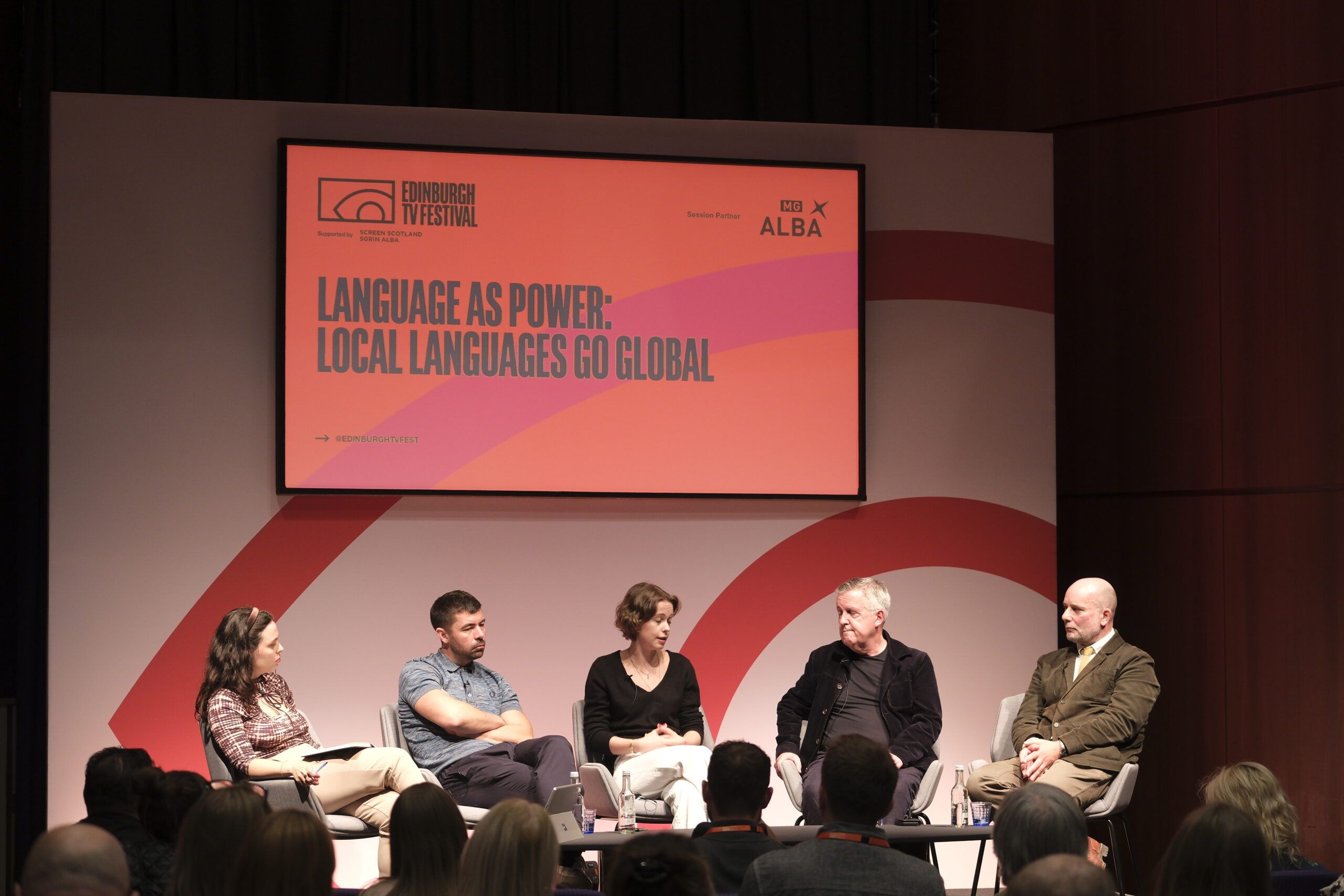
Edinburgh, 21 August 2025 – MG ALBA has announced its involvement in Screen Scotland’s landmark Take Three talent development initiative, confirming funding for two Gaelic short films as part of the scheme.
The announcement was made today at the Edinburgh TV Festival, where MG ALBA sponsored and contributed to the prestigious panel session Language as Power: Local Languages Go Global. The session brought together leading voices from across the screen industries to discuss how Gaelic and Irish media are breaking through to mainstream audiences.
Gaelic Short Films through Take Three
Take Three, launched earlier this year by Screen Scotland and supported by the National Lottery and BFI, is Scotland’s most ambitious film talent development programme in a generation. MG ALBA’s backing will see two Gaelic short films produced under the scheme, providing vital opportunities for emerging Gaelic voices and building on the growing success of Gaelic-language screen content.
Kieran Hannigan, Head of Scripted at Screen Scotland said:
“Screen Scotland’s Talent Builder is a five-year commitment to early-stage filmmaking talent in this country. The interlinked programmes are designed to widen access, create greater opportunity and build a clear pathway for talent. We’re already working with Astar Media in Stornoway on Opening Shot, our early development shorts programme so It’s fantastic to now have MG ALBA on board to offer additional opportunities, specifically for Gaelic talent. Screen Scotland is committed to supporting Gaelic talent and has also supported a range of Gaelic development projects and productions, including An t-Eilean and Hebridean Baker: Nordic Islands.”
Bill MacLeod, Commissioning Editor at MG ALBA, said:
“MG ALBA are delighted to be funding two Gaelic short films under the Take Three talent development scheme, a Screen Scotland project funded by the National Lottery and BFI. This initiative is another important step in developing the next generation of Gaelic filmmakers and storytellers.”
The move highlights MG ALBA’s increasing focus on Gaelic drama and talent development. Following the success of hit Gaelic noir An t-Eilean – which scooped both the Drama & Entertainment Prize and the Grand Prix at the Prix CIRCOM 2025 Awards – MG ALBA has secured increased government support for 2025/26, enabling fresh initiatives in drama, including involvement in Take Three and ongoing discussions with BBC Film for a forthcoming Gaelic feature film development call.
Spotlight at the Edinburgh TV Festival
MG ALBA’s announcement came during its sponsored panel at the Edinburgh TV Festival – one of the most prestigious events in the television industry calendar.
Entitled Language as Power: Local Languages Go Global, the session challenged industry stereotypes about Celtic-language content and celebrated the critical and commercial success of productions such as Kneecap and An t-Eilean. It also explored the opportunities and challenges in ensuring Celtic-language media continues to thrive.
The panel was hosted by award-winning journalist and author Sophia Smith Galer, and featured a stellar line-up:
Speaking at the Festival, MacLeod highlighted the importance of showcasing Gaelic storytelling on such a significant platform:
“To be sharing a stage at the Edinburgh TV Festival with such exceptional talent is a proud moment for Gaelic media. This visibility shows there is fertile ground and real appetite for Gaelic stories, particularly among younger audiences. Gaelic is not just surviving, it is thriving – and the industry is taking notice.”
Looking Ahead
MG ALBA’s participation in Take Three marks a major step forward for Gaelic cinema, underlining the organisation’s determination to nurture new talent and stories that resonate both locally and globally.
With fresh investment and collaborations on the horizon MG ALBA is cementing its place at the heart of Scotland’s screen storytelling future.
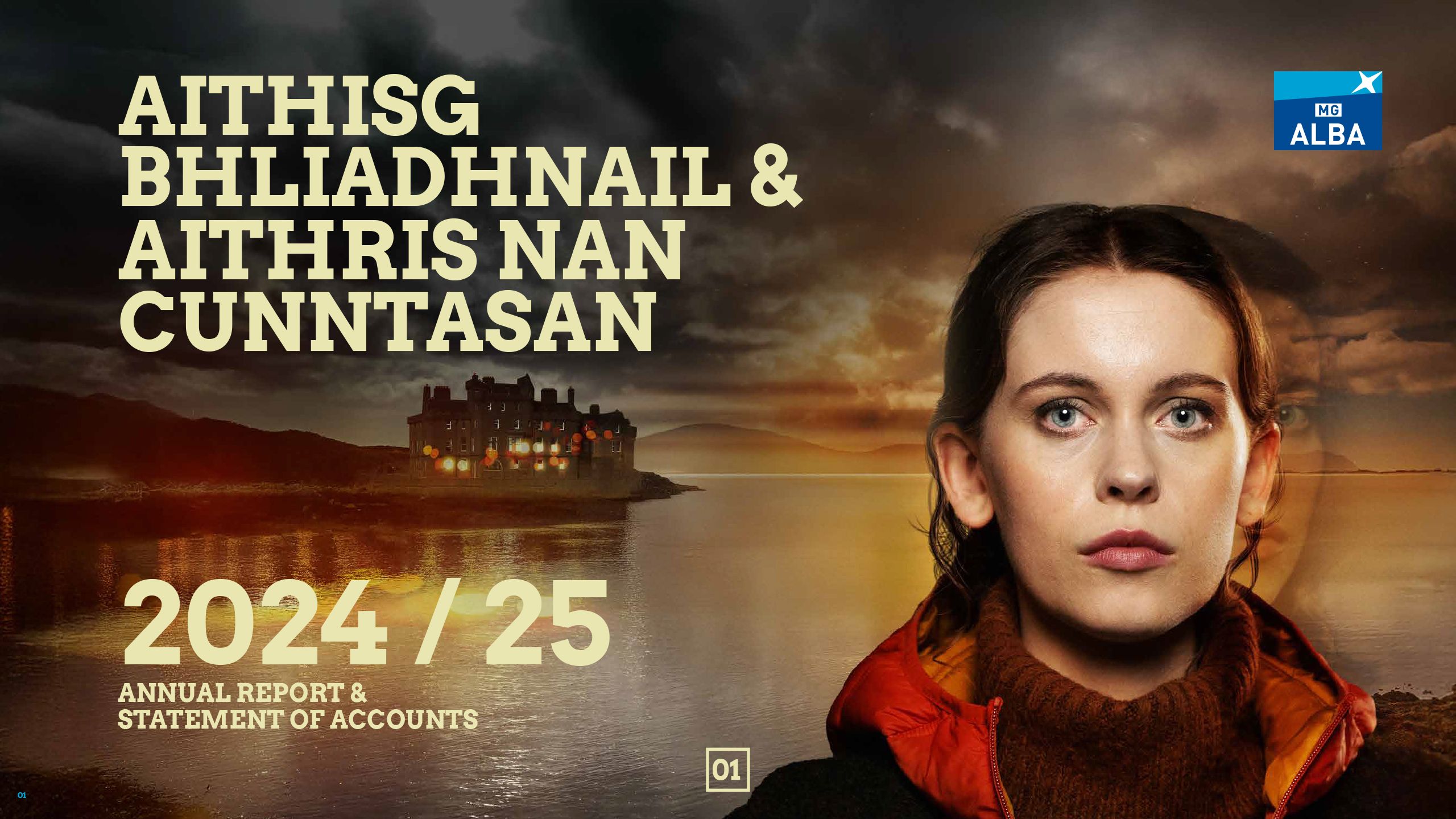
MG ALBA has published its 2024/25 Annual Report, marking a transformative year for Gaelic broadcasting with record digital viewing figures, a landmark drama series, and a renewed call for fair and sustainable funding.
The annual report celebrates An t-Eilean — a gripping crime thriller filmed on location in Harris — as the most successful Gaelic TV programme ever made. In the 2024/25 year alone, it drew 1.6 million BBC iPlayer views, accounting for 20% of the record-breaking 8.1 million total views for Gaelic content. This standout performance highlights the impact of high-quality Gaelic drama and its growing appeal, with An t-Eilean also attracting international attention from outlets such as The Hollywood Reporter.
In a major international milestone, MG ALBA is also celebrating An t-Eilean’s recent triumph at the Prix CIRCOM 2025 awards, where it took home the coveted Grand Prix – the highest honour in the prestigious European television awards.
“This was a year of creative ambition and digital transformation,” said MG ALBA Chair John Morrison. “With every £1 invested, we attracted £3 more in funding. But to maintain this momentum and reach younger, digital-first Gaelic speakers, we urgently need a longer-term, realistic budget.”
Key highlights:
Despite these achievements, the report warns that MG ALBA’s core budget is still £10 million behind where it would be if it had kept up with inflation — putting future content creation and digital innovation at serious risk. Continued investment is essential to ensure Gaelic media can thrive in an increasingly competitive and digital-first landscape — and a dedicated Gaelic Growth Deal is now vital to secure the sector’s future.
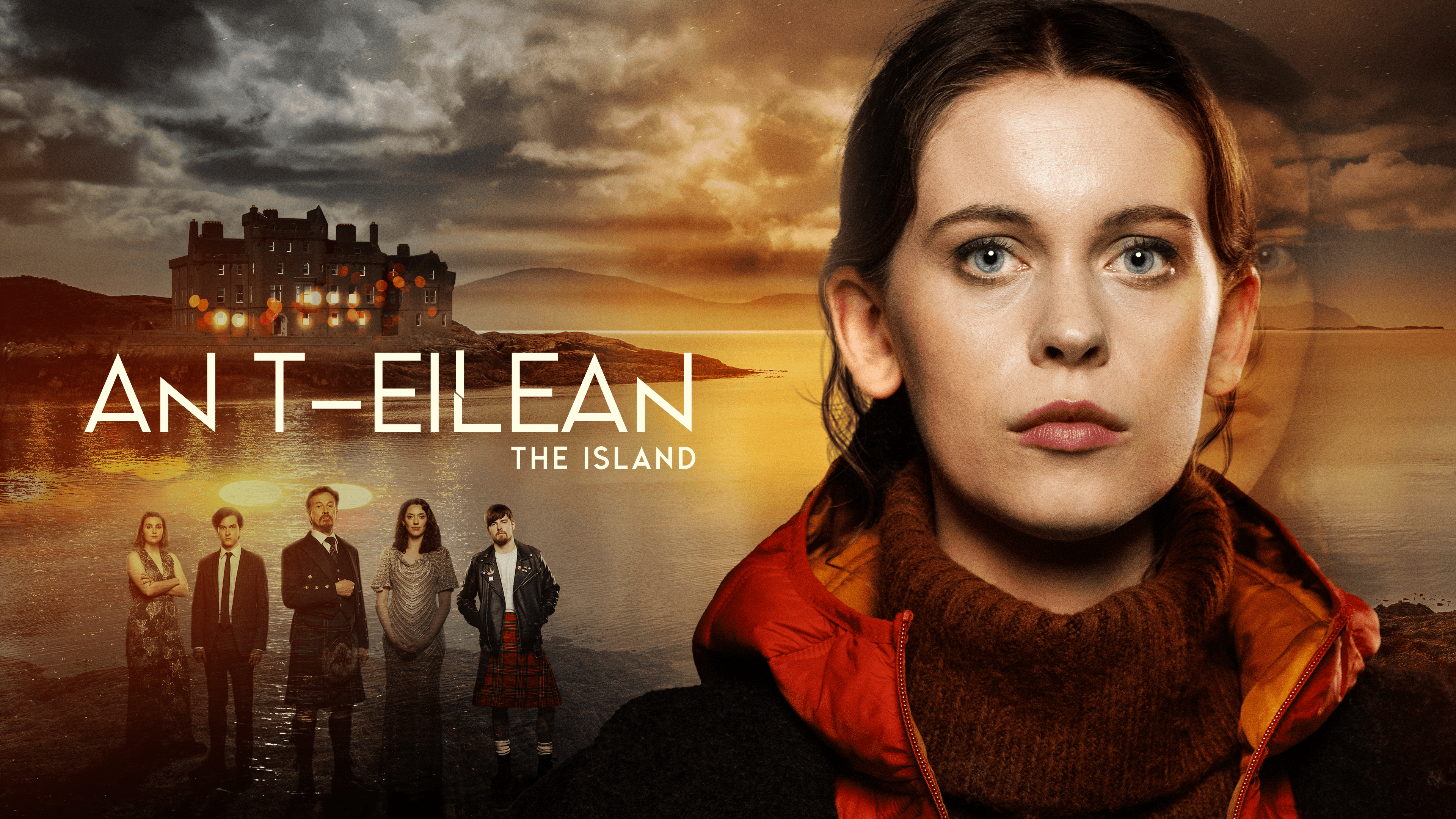
MG ALBA has announced the crime thriller An t-Eilean (The Island) as winner of the Drama and Entertainment prize at the international TV awards, Prix CIRCOM 2025. The award win comes after a rise in competition entries, with judges from across 15 European regional public service broadcasters selecting the winner. The drama was produced by Black Camel Pictures and commissioned by BBC ALBA.
Set against the elemental landscape of the Outer Hebrides, An t-Eilean (The Island) is a compelling crime story that follows a family caught up in a murder investigation very close to home. When their mother is found murdered in the family castle, four adult children return to the Scottish island of their birth as their father is questioned over her death.
The award will be officially accepted during the gala award ceremony at the CIRCOM Annual Conference in Barcelona on 22 May.
John Morrison, Chair of MG ALBA, said: “Winning a top European award from our television peers is wonderful news for An t-Eilean and for Gaelic language broadcasting. It shows that stories told in Gaelic can compete with the very best entertainment and drama across Europe.
“Congratulations to everyone involved, the commissioners, the writers, the production team and the actors who all performed superbly. MG ALBA and our partners in the BBC will take this as a huge vote of confidence in our strategy to take Gaelic to global audiences while not forgetting about our own domestic viewers.”
Arabella Page Croft, executive producer at Black Camel Pictures, added: “We can’t quite believe it - An t-Eilean has won the Circom European Drama Award!
“It’s a huge honour, and such a tribute to the talent, heart and hard graft of the whole creative team. Making An t- Eilean the first high-end Gaelic drama in partnership with BBC and MG ALBA, Screen Scotland and All3Media International was a glorious creative challenge.
“We set out to create a crime series that felt authentic and true to the Western Isles and its wonderful language, and to see our work recognised by an international jury of broadcasters is a fantastic achievement. We are hugely proud at Black Camel and it means the world to see regional voices and authentic storytelling celebrated on a prestigious European stage like this.”
David Smith, Director at Screen Scotland said: “This is fantastic news, An t-Eilean marks a step-change in Gaelic language drama and has won the hearts of audiences across Scotland and now Europe. This win is testament to the ambitions of all our partners.”
David Swetman, SVP scripted content at All3Media International added: “We’re so pleased that the appeal of Black Camel’s wonderful drama has been recognised with this award from the Circom jury of European broadcasters.”
An t-Eilean was commissioned by BBC ALBA and funded by MG ALBA, Screen Scotland, Black Camel Pictures and All3Media International. The drama premiered in the UK on BBC ALBA January 2025, with a further broadcast window on BBC Four.
Catherine Carswell’s sadly neglected novel reveals the life of a strong-willed and free-thinking young woman brought up in a bourgeois, strict and Presbyterian Glasgow family in Sàr Sgeòil – Open the Door.
The documentary, which is produced by Caledonia TV, focuses on main character Joanna Bannerman, who is born a prisoner of Victorian and Edwardian values, but into a time of possibilities.
Artistic, idealistic and passionate, she breaks free from middle-class, Presbyterian values to pursue love and fulfilment.
However, this story was not just Joanna Bannerman’s, it also belongs to Catherine Carswell, who used the 1920 novel to explore female desire – a taboo subject at the time, especially for a female writer.
Born Catherine Macfarlane in Glasgow in 1879, Carswell was the daughter of two devout Presbyterians who met at an evangelical meeting. George Macfarlane, her father, was an affluent merchant trader and became a town councillor, and both he and his wife Mary Anne were pillars of the church.
In her novel, Catherine’s alter-ego Joanna studies at the Art School, has talent and dreams of earning her living in London. She has a wide circle of friends, one of whom was with writer D.H Lawrence.
In the programme, Cathy spoke to Gerry Carruthers, Professor of English at the University of Glasgow. “This is a new time of frankness,” he said.

Cathy and Gerard Carruthers with a copy of the novel
“It’s a new time of explicitness. Not in a prurient sense, but in the sense that people want to begin to tap in both psychologically and sensually to the body as well as the mind.”
Catherine eventually did move to London, where she supported herself as a journalist and married Donald Carswell, who had loved her from afar for a long time.
Much like Catherine, main character Joanna also followed her dreams in London, using her artistic talent to get by. Her life, like her creator’s, had been very different from the one of a young middle-class woman born at the end of the 19th century.
Catherine Carswell experienced a critical time in the lives of women. Her novel, Open the Door gives a remarkable insight into that changing world, and Cathy MacDonald tells the story in Sàr Sgeòil – Open the Door.
Sàr Sgeòil – Open the Door airs on BBC ALBA on Tuesday 19 September at 9pm and will be available on BBC iPlayer for 30 days after first airing.
Popular BBC ALBA travel show, Mach à Seo, is returning for a seventh series, beginning on Wednesday 21 September.
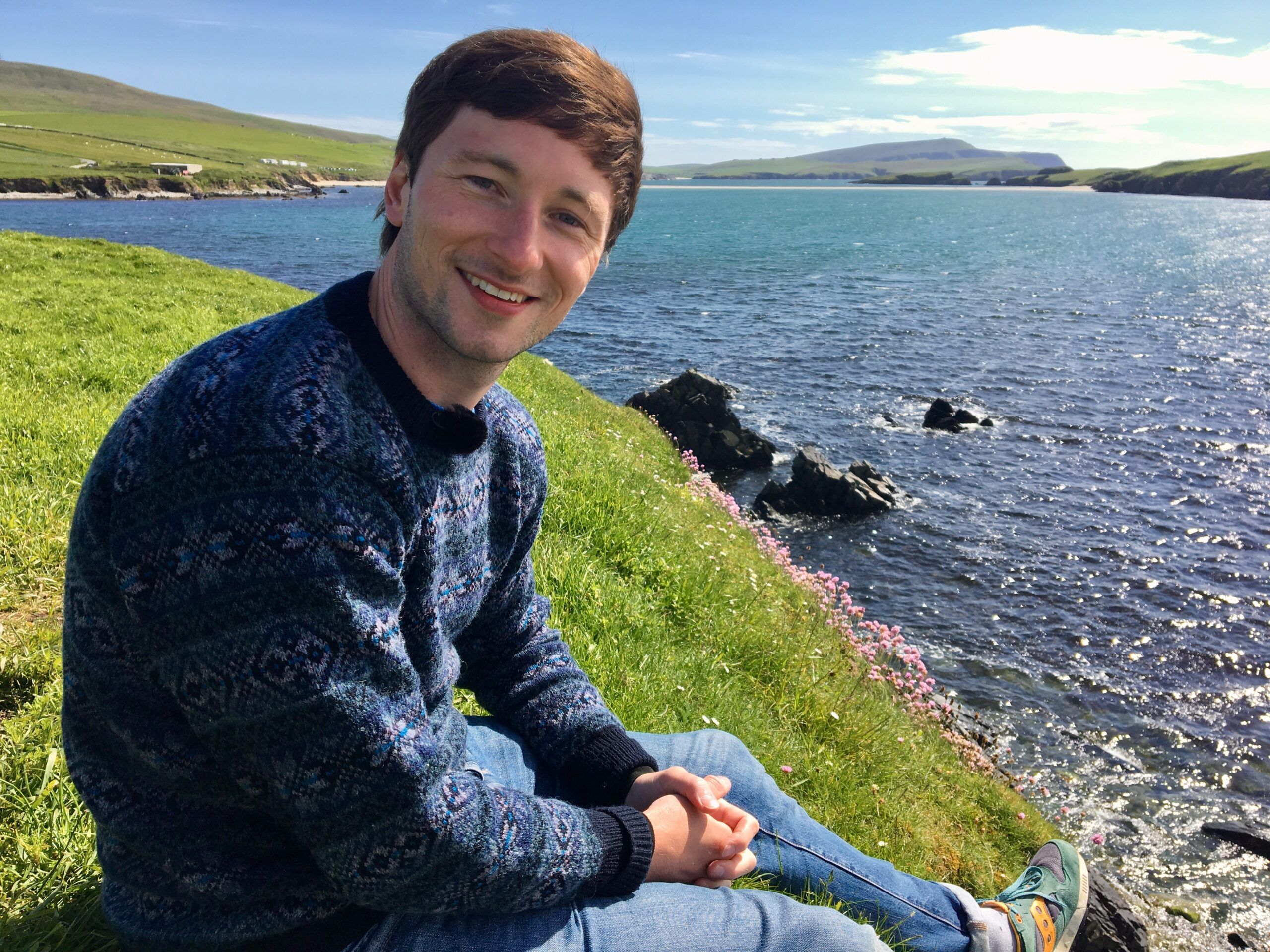
From Caithness to the Campsies, from the big city to the Borders, presenter Ramsay MacMahon once again takes us with him on his weekend adventures exploring Scotland in Mach à Seo, produced by Caledonia TV.
Ramsay has revealed the top five things to do and see from his TV travels.
1. Beachcombing – St. Ninians beach – Shetland
St. Ninians beach is a large natural sand causeway with sea on either side. Often featured on promotional material of Shetland, the beach is beautifully picturesque and an absolute must-visit. Ramsay describes it as ‘a glorious tombolo beach’ and ‘a spectacular natural wonder’.

The beautiful St. Ninians beach
2. Sampling Smokies – Arbroath
A second-generation family business, Arbroath Fisheries was established in 1969, and specialises in ‘Arbroath smokies’ or whole, smoked haddock. Another must-visit on Ramsay’s list, he said: “Call in to see them smoking the fish, and buy it while it’s still warm. It’s best served hot with lots of butter!”
3. Whisky Galore – Am Politician pub and museum – Eriskay
Am Politician takes its name from the stricken vessel S.S Politician, which ran aground off Eriskay in 1941. In the bar, you’ll find some of the salvaged artefacts made famous in the classic film Whisky Galore. Ramsay said:“It has the best beer garden on the planet with a view of the sunset and it’s a hop, skip and a jump from the beach.” The island is steeped in history, and islanders are still finding buried bottles, with some only being found last year when one moved into a new house!

Ramsay enjoying a dram with a view at Am Politician
4. Rhino mudbath – Blair Drummond Safari Park – Stirling
‘Dot’, an affectionate rhino, made quite the impression on Ramsay when he got the chance to give her a mud bath at Blair Drummond Safari Park, Stirling. Ramsay said: “She knew exactly what was happening. After washing her sides, she turned round so I could give her bum a wee scratch too!”
5. Swinging a claymore – Duncarron Medieval Village – Carron Valley
Last but by no means last, Ramsay has added Duncarron Medieval Village to his line-up of must-sees. Ramsay visits here in the upcoming series 7 of the programme, and it’s an exciting visit at that!

Ramsay learning to sword fight with Gladiator star Chick Allan
He spent the afternoon learning how to sword fight with Chick Allan, who features in the 2000 film Gladiator, and founded ‘Combat International’ who recreate fighting styles and the look of warriors from many different eras. The Medieval Village is home to a training academy for all sorts of combat, and Ramsay is put through his paces.
The new Mach à Seo series begins on BBC ALBA on Thursday 21 September. All episodes will be available to stream on BBC iPlayer for 30 days from first airing.
Legendary Gaelic sport broadcaster Hugh Dan MacLennan is set to call time on his commentary career in shinty following the Tulloch Homes Camanachd Cup Final on 16 September, live on BBC ALBA.
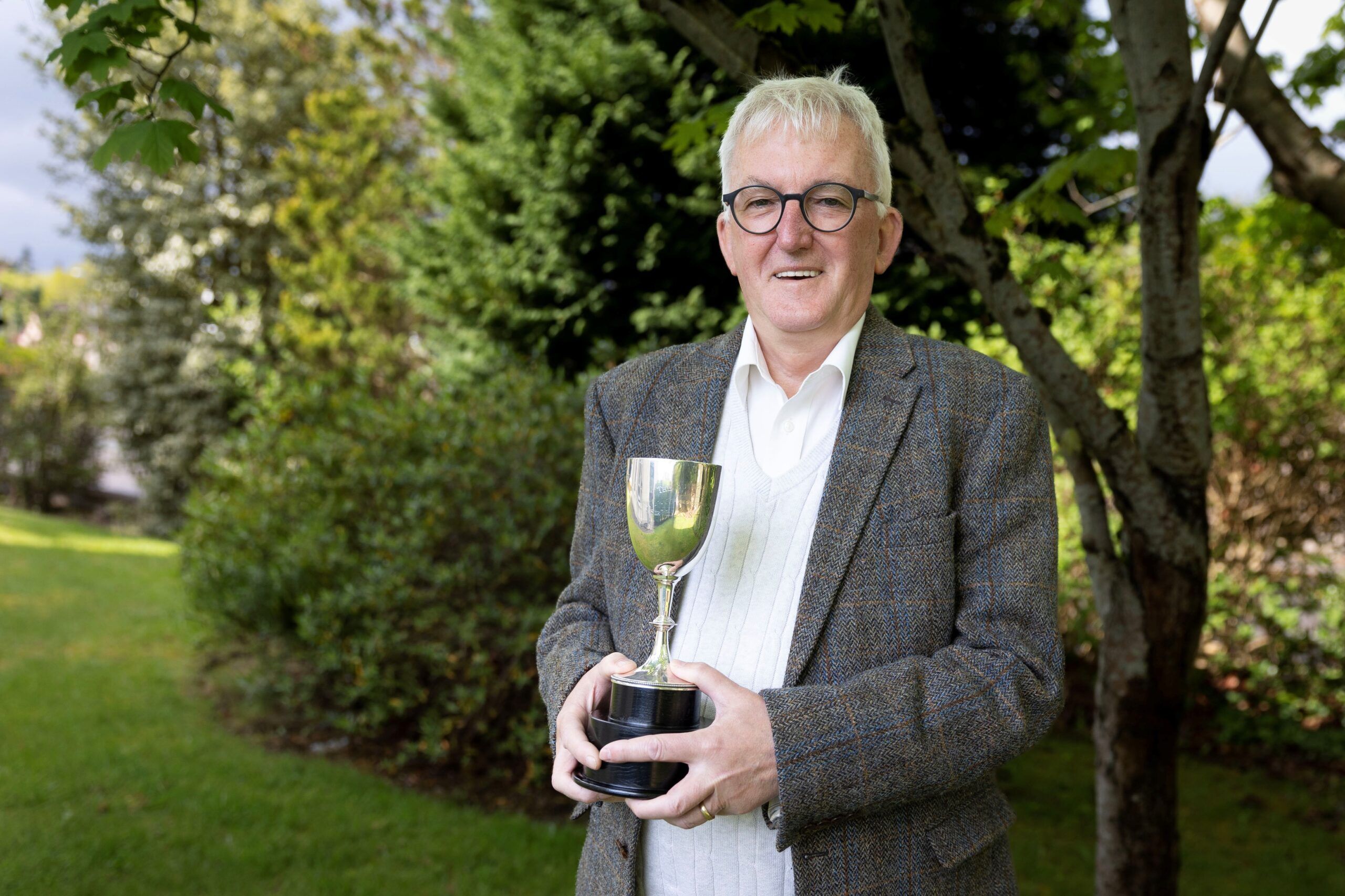
The final, between Oban Camanachd and Kingussie, will be the 100th game to be played at Bught Park in Inverness, and will be the final commentary role in shinty for Hugh Dan, who voiced his first Camanachd Cup final in 1983.
Hugh Dan, who is also known to fans who follow Gaelic coverage of rugby, curling and football, was born in Caol, Lochaber, in 1956. He went on to qualify as a Gaelic teacher, and taught the language at Millburn Academy in Inverness. It was here he met John Willie Campbell, who he later succeeded in the broadcasting hot seat.
Later this year, BBC ALBA will be airing a documentary about the life and work of the star sports broadcaster, produced by Sgeul Media.
Hugh Dan has spearheaded the growth of Gaelic sports broadcasting and will continue with his sports reporting and commentary on BBC ALBA away from shinty for another couple of months before retiring at the end of the year.
It is likely to be a close encounter between the two teams, who have both beaten each other in recent months. In July, it was Kingussie that ran out 1-2 winners. However, it was Oban Camanachd who were 2-1 victors when the two met in August.
Kingussie will be confident, as they come into this one with the competition’s top scorer, James Falconer, who has bagged five goals on their run to the final.
The Tulloch Homes Camanachd Cup Final is live on BBC ALBA, iPlayer, BBC Radio nan Gàidheal and BBC Sounds.
Two childhood friends turned go-getting entrepreneurs, Angela and Katie, have started their own cleaning business to take advantage of the AirBnb boom. But with a TV crew in tow chaos is never far away in BBC ALBA’s hilarious mockumentary series, Glan Fhèin.
Glan Fhèin is produced by The Comedy Unit, the TV hit-makers behind Scot Squad, Still Game, Chewin’ the Fat, Gary: Tank Commander and many other smash comedy shows.
The sitcom, which will be one of the main highlights of BBC ALBA’s autumn schedule, will be on screens from September 20th at 10pm.
Glan Fhèin is written by up-and-coming comedy talents Lana Pheutan and Hannah McKirdy, who also star in the show as best friends Angela and Katie.
The three-part show dishes the dirt on Angela and Katie’s cleaning company – Glan Fhèin, a punning name which means both ‘really clean’ and ‘really good’.
The plucky new business has two employees – scary office manager, Betty, played by TV newcomer Mairi Alice Macdonald, and hapless ex-con, Daniel, performed by Calum Macdonald. No one is quite sure what Daniel’s pregnant girlfriend, Dido, does but Mairead Hamilton brings a hilariously loopy energy to the role. Other regulars include smooth- tongued charmer, Seonaidh, performed by Iain Beggs, and his put-upon brother, Calum, played by Sam James Smith in his first TV role.

The cast of Glan Fhèin. Front row L-R: Mairead Hamilton, Calum Macdonald. Back row L-R: Mairi Alice Macdonald, Hannah McKirdy, Lana Pheutan.
The series also features a cameo from rising star of Scottish stand-up, Stuart McPherson, playing a brash property owner who mangles the pronunciation of his Gaelic-named holiday home.
Glan Fhèin aims to clean-up and give the competition a bleaching. However, Katie and Angela find a few blockages along the way…
Demanding customers, business rivals, angry protestors, disgruntled employees, pesky wildlife, stubborn stains, and romantic entanglements – it’s dirty work but someone’s got to do it!
But no matter how messy things get, Angela and Katie are determined to pull on their rubber gloves, pick up their squeegees and deliver big laughs. It’s all good, clean fun!
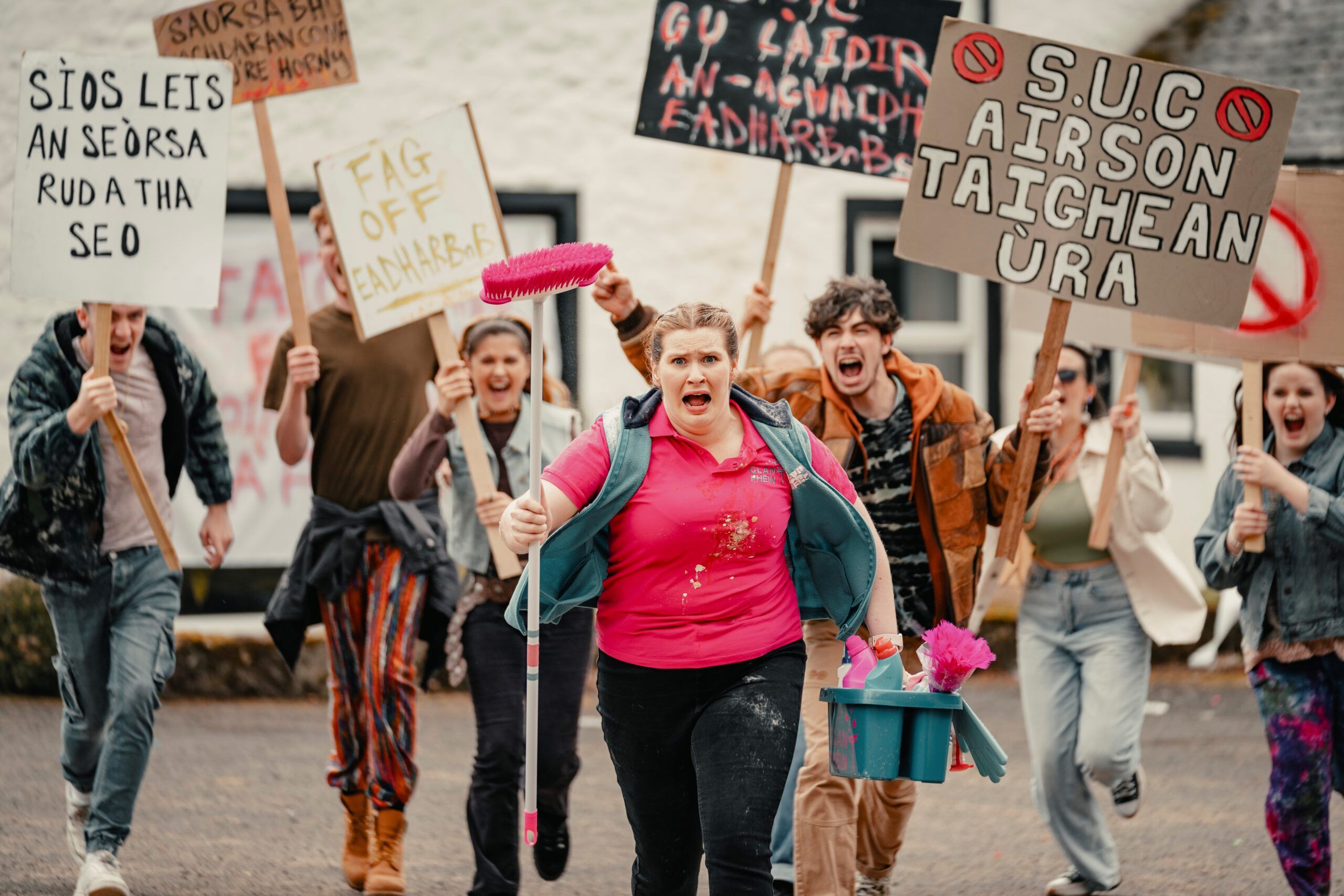
Angela clashes with angry locals protesting about short-term lets.
Hannah and Lana are Scotland’s latest comedy writing and performing sensation. The Comedy Unit has worked with several writer-performer duos over the years, notably Greg Hemphill and Ford Kiernan (Chewin’ the Fat, Still Game) and Iain Connell and Robert Florence (Burnistoun, The Scotts).
Like these partnerships, Hannah and Lana are a stellar pair, who honed their writing skills on sketch shows before turning their attention to sitcoms.
With Glan Fhèin, they’ve created fantastic characters for themselves, while also populating the show with a cast of recognisable comic personas that will tickle the funny bones of viewers the length and breadth of the country.
Co-creator Lana Pheutan says, “From the day we came up with this idea for ‘Glan Fhèin’ to our last day on set, this programme has lifted me up. I am so proud of myself and Hannah, who worked so hard to create the amazing characters in our scripts.
“We wanted to write something that felt new and different, but wanted there to be characters and a community that the viewers would recognise as well. It was so easy to bring this world to life because it’s not far from the world we’re in right now, just crazier with a lot more misogyny.
“I can’t wait to see the whole thing and I hope everyone likes it as much as I do.”
Co-creator Hannah McKirdy added, “As young writers, it’s not often that an opportunity like this presents itself. I am very proud of the scripts we wrote, and the characters and the world we created.
“We were so lucky that such good and talented actors (Mairead Hamilton; Iain Beggs; Calum MacDonald; Mairi Alice MacDonald and Sam James Smith) were willing to be involved, and they did amazing work to bring what we wrote to life.
“I hope that people will enjoy Glan Fhèin as much as we both enjoyed writing it together.”
Rab Christie, Managing Director of The Comedy Unit says, “At the Comedy Unit we are lucky enough to have been working with Hannah and Lana on comedy material for the last couple of years.
We are thrilled McKirdy and Pheutan have created such a fantastic ensemble workplace sitcom! It is a great idea for a show and features a terrific twosome at the heart of the action in Angela & Katie!
“Hopefully the audience will find something hysterical to relate to as Glan Fhèin has universal appeal. There’s something for anyone who has ever worked with a pal, stayed in a short-term let or pulled on the rubber gloves to clean-up something icky!”
Bill Macleod, Commissioning Editor for BBC ALBA, says “Glan Fhèin is a comedy clean sweep – brilliantly written, crammed with jokes and full of faultless performances. At its heart it’s about friendship – mismatched and messy at times, but always warm-hearted.”
Glan Fhèin first airs on BBC ALBA on Wednesday 20th September at 10pm. All three episodes will be available on BBC iPlayer for 30 days after first airing.
From the boreal peatlands of Canada, to the expansive peat plains of Finland and the
beautiful blanket bogs of home – Anne McAlpine takes us on a journey exploring
spectacular peatlands around the world.
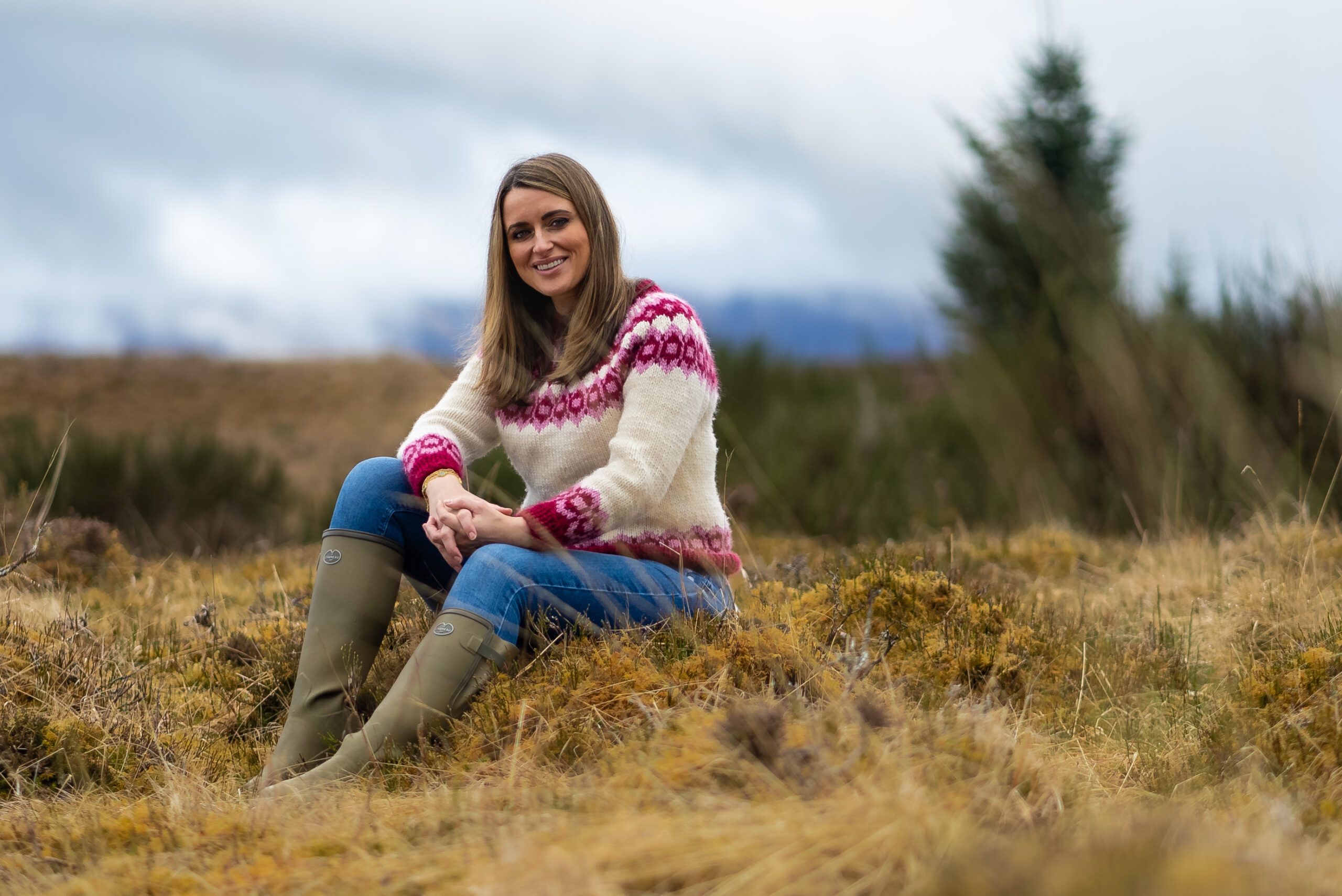
This stunning documentary series takes us to Iron Age bog bodies, remarkable pool
systems, shielings which built communities on the moor, and bogs which cover stone
walls older than the Pyramids.
Anne also discovers how peatlands, which cover just 3% of the planet yet hold more
carbon than all the forests combined, are an important ally in the fight against climate
change. But to keep our peatlands from leaking out all the carbon they hold, we need to
look after them.
In episode one, Life on the Bog, Anne discovers what exists on the peat: from rutting stags
that roam the peatlands in Harris, to salamander-eating pitcher plants in Canada and the
watery legacy of peat extraction in the Netherlands.
In her home island of Lewis, Anne joins local Danny Mackay as he makes the finishing
touches to a peat stack to learn about how small-scale use of peat has long heated homes
in the Highlands and beyond.
We also hear from a peat producer in Finland, where times are changing amidst
environmental concerns, to learn about the use of peat on a commercial-scale.
Our Peaty Past, episode two, focuses on times when peat has come to the fore.
Remarkable stories include the use of bog moss for field dressings in the First World War
thanks to a widespread civilian volunteer effort, with origins at the Royal Botanic Garden
Edinburgh.
Anne meets Professor of Conflict History and Archaeology, Tony Pollard, of the University
of Glasgow, who has been exploring Scotland’s many battles. He relays how Robert the
Bruce’s boggy battle tactics proved decisive.
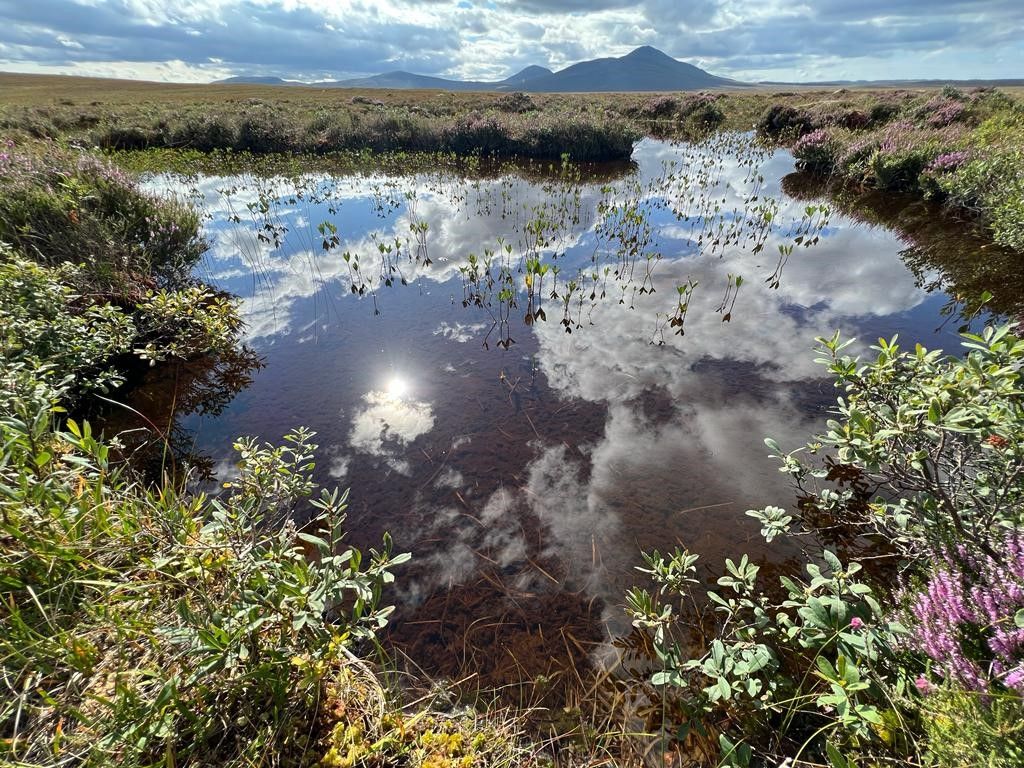
Bog pools in the Flow Country, northern Scotland, where scientists are monitoring the
health of Europe’s biggest blanket bog.
When speaking about the battle of Loudoun Hill, he said: “What Robert the Bruce cleverly
does, is he would come to the battlefield early, and work out how he could turn the terrain to
his advantage.
“Horses are not going to be able to operate over those bogs. To limit the space even more,
Robert the Bruce and his men dug three ditches, creating choke points and bottlenecks.
“The English cavalry could only pass through 500 at a time. At that point, Robert the Bruce’s
Scottish army, with their spears, come in and basically cut them to pieces.”
Anne also visits Roman Vindolanda Fort and Museum, where treasures include the only
surviving boxing gloves from the entire Roman Empire, preserved in the peaty landscape.
The final episode of the three-part series, The Power of Peat, looks at the dramatic
outcomes when peat is disturbed, and Anne continues her trip through the Netherlands,
visiting a city built on soft peaty soils that are slowly sinking.
Back on home turf in the Outer Hebrides, Anne finds out how the peat moors inspire artist
Màiri Gillies and popular local band Peat & Diesel.
Throughout the series, Anne makes many extraordinary findings:
“In Scotland, peat is behind some of our most iconic scents, tastes and sights” she said.
“Growing up in the Western Isles, peat played a central role in community life. Many
islanders will have memories of summers spent cutting peat with family, friends and
neighbours and will recognise the inviting smell of a peat fire keeping houses warm through
the winter.
This series really opened my eyes to the importance of keeping our peatlands healthy. From
preserving Roman artefacts to having a pivotal role in storing carbon, it’s been fascinating
to learn about the power of the humble peat in combating climate change.”
The Secrets in the Peat series begins on BBC ALBA on Wednesday 20 September at 9pm.
All three episodes will be available to stream on BBC iPlayer for 30 days from 20
September.
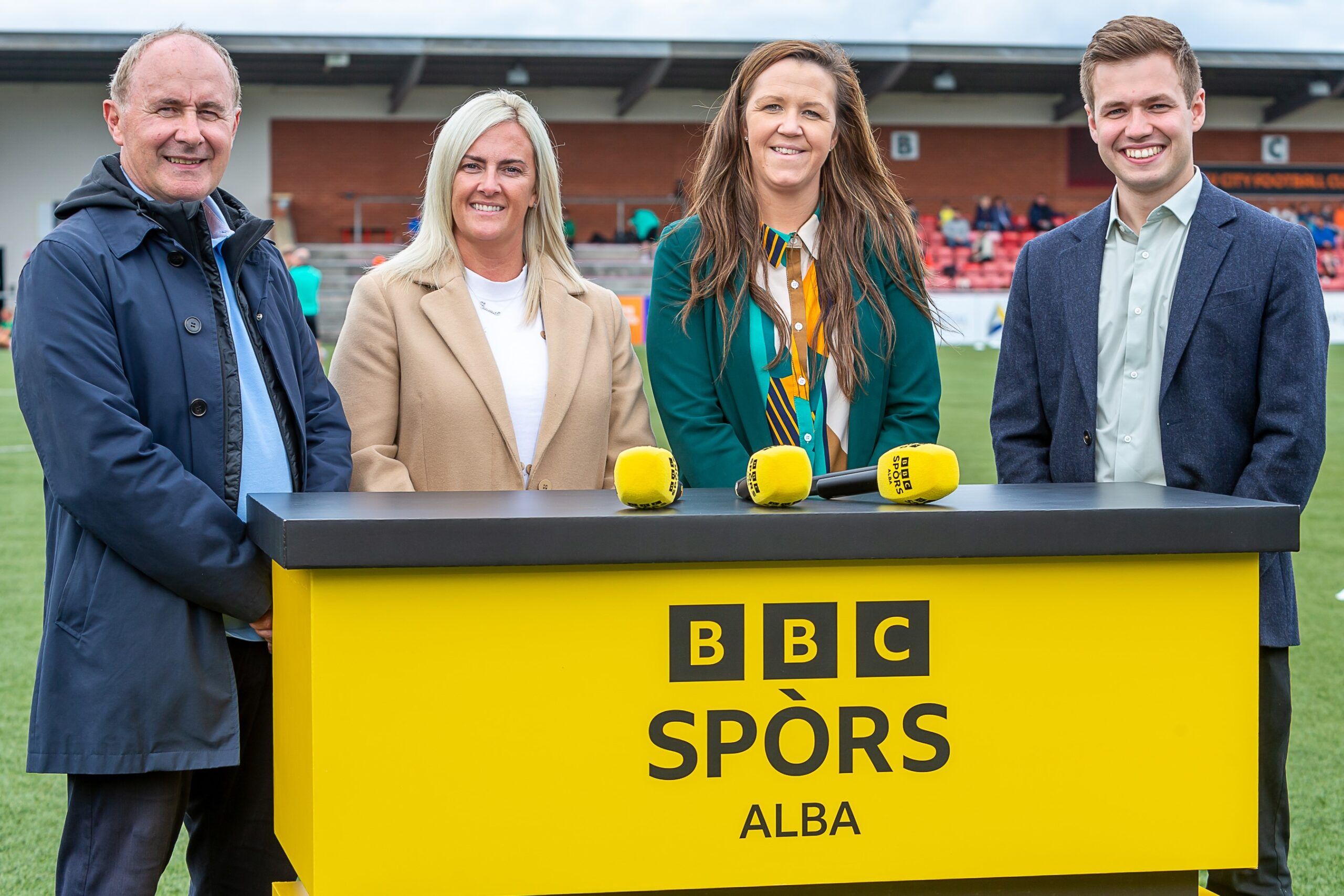
Sunset+Vine will be producing BBC ALBA’s sports coverage with a new multi-annual contract.
The UK-based company landed the three-year deal after a competitive commissioning process. Sunset+Vine will be responsible for delivering the coverage of at least 176 hours of live sporting events per annum, including football, shinty and rugby.
This will see the sports indie deliver a minimum of 26 live SWPL games each season and 21 live SPFL League 1 games and Glasgow Celtic Society Challenge Cup games.
The global sports producer will also cover a range of live shinty with this year’s Camanachd Cup Semi-Finals, the Cottages.com MacAulay Cup Final, the Valerie Fraser Cup Final and the historic Tulloch Homes Camanachd Cup Final all taking place in August and September.
Sunset+Vine’s first live match was the Camanachd Cup Semi-Final between Kinlochshiel and Kingussie on 5th August and the team has since broadcast further shinty and the first of the 2023 season SWPL games.
Recent coverage also features the debut of BBC ALBA’s brand-new sports branding. The new look adopts the bold and iconic yellow branding used across other sports brands in the BBC portfolio, making BBC ALBA’s high-quality sports brand instantly recognisable to audiences.
Margaret Cameron, Director of Content at MG ALBA, said: “Sport continues to be a major draw for BBC ALBA audiences and we’re committed to building on our reputation of delivering high-quality, high-impact sporting moments.
“This three-year contract is of strategic importance to MG ALBA and BBC ALBA. We look forward to working with Sunset+Vine to build on BBC ALBA’s reputation as a provider of high-quality sports coverage and our commitment to, in particular, Scottish women’s sport.”
Grant Philips, Head of Sunset+Vine Scotland, said: “At Sunset+Vine, we specialise in live sports coverage in Scotland, the U.K. and around the World. We are delighted to be working with MG ALBA and BBC ALBA to bring a brand new and fresh approach to their sports output. We will deliver the highest production standards over the next 3 seasons for BBC ALBA’s viewers.”
Watch LIVE Cinch SPFL League 1 from Saturday 26th August and continuing ScottishPower SWPL coverage on BBC ALBA and BBC iPlayer from Sunday 27th August.
LIVE coverage of shinty’s WCA Mowi Valerie Fraser Cup Final features on BBC ALBA and BBC iPlayer on Saturday 2nd September 2023.
The digital future of Gaelic media is the focus of MG ALBA as they publish their Annual Report today.
The annual overview of the work of MG ALBA and the wider sector highlights high audience appreciation and an award-winning year for BBC ALBA content, as well as a range of activities and initiatives which are supporting the Gaelic media sector.
However, Gaelic media is not immune to the challenges within the wider media sector, with diminishing linear audiences, and the impact of high broadcast inflation key drivers for change. Positive growth in short form content views across platforms points to the need to secure Gaelic’s space in the digital media domain, as stressed by Chair John Morrison:
“I am under no illusions about the task ahead. Media is going through a time of rapid change driven by the digital revolution, and MG ALBA is no different. The ways in which audiences consume content are almost unrecognisable from five years ago. We must follow the audience.”
Gaelic media must react to the changes in the marketplace but is severely hampered by a funding model which John Morrison states is “not working”. This is particularly challenging when compared with other minority language media providers who have stability of funding due to statutory recognition as outlined by Chief Executive Donald Campbell:
“At a time when the survival of Gaelic media is at stake, I am proud to report that appreciation of our Gaelic media content has never been higher. But I must also point out the high degree of challenge – at a time of ferocious competition and high inflationary pressures – in continuing to deliver a service that depends on annual and uncertain funding allocations and which, unlike the Welsh and Irish language services, has no statutory protections.”
MG ALBA continues to actively engage with the UK Government, Scottish Government and the BBC to improve the settlement for Gaelic media. This includes a recent round table, hosted by the Department of Culture, Media & Sport, to discuss the coordination of funding to Gaelic media.